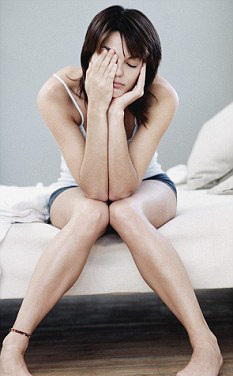|
 Exhausted: The survey found that 93 percent of adults lacked energy as a result of poor sleep |
|
More than half of us are unable to get a good night’s rest, say researchers following a major study. They warn that the lack of sleep is having a serious knock-on effect on our health. Sleep expert Professor Colin Espie, of the University of Glasgow and co-founder of the organisation Sleepio, has collated interviews with 12,000 adults in Britain’s largest study of sleep patterns. ‘Insomnia affects people’s quality of life during the day, not just their sleep at night,’ he said. ‘Living with poor sleep and its consequences is not only very common, but it is in all likelihood degrading Britain’s health.’ In total, 51 percent of adults struggle to nod off or remain asleep. Women suffer far more than men, with 75 percent reporting problems compared with 25 percent of men. The survey found that 55 percent of adults reported relationship difficulties as a result, it affected the concentration of 77 percent, 64 percent said they were less productive at work, 83 percent had mood problems and 93 percent lacked energy. Professor Espie, who believes better treatment for sleep deprivation should be available on the NHS, added: ‘This is not a trivial matter. Persistent poor sleep elevates the risk of developing new illnesses. ‘This has been shown in disorders such as diabetes, but also very convincingly in depression.’ He added that a quarter of those with insomnia had suffered for more than 11 years. Another survey of 3,000 adults found that 70 percent of people believe they don’t get enough sleep and 57 percent lie awake at night worried about work or money. The result is that one in ten check work emails, 6 percent wake up their partner if they can't sleep, 26 percent listen to soothing music and 18 percent believe having sex helps. The study, commissioned by the retailer IKEA, found that half of people blamed a poor mattress for a bad night’s sleep. But more women seemed to avoid any problems, with 21 percent regularly getting more than eight hours' sleep compared to just 14 percent of men. It also discovered that one in ten adults go to bed with a teddy bear. (Read by Emily Cheng. Emily Cheng is a journalist at the China Daily Website.) (Agencies) |
研究人员在一项大型研究中发现,超过半数的英国人晚上睡不好觉。 他们警告说,睡眠不足会给我们的健康带来严重的连锁反应。 在这项英国规模最大的睡眠模式研究中,格拉斯哥大学的睡眠专家、Sleepio机构的共同创始人科林•艾斯皮教授核对了和1.2万名成人的访谈记录。 他说:“失眠不光会影响晚上的睡眠,还会影响人们白天的生活质量。” “英国人普遍睡不好觉,并遭受睡眠不佳的后果,英国民众的健康水平也很可能因此而下降。” 总体来看,英国有51%的成人入睡困难或睡不安稳。女性的睡眠问题比男性严重得多,75%的女性报告说自己有睡眠问题,而这样的男性为25%。 调查发现,55%的成人报告说睡眠问题导致自己的恋情不顺,77%的人说睡眠不佳让自己无法集中注意力,64%的人说自己的工作效率下降了,83%的人因此情绪不佳,93%的人缺乏干劲。 艾斯皮教授认为,国家医疗服务体系应该为睡眠不足提供更好的治疗。他补充说:“这可不是小事。持续的睡眠不佳会增加患新疾病的风险。” “睡眠不足会导致身体失调,患上糖尿病等疾病,而且也会引发抑郁症,这些证据都很有说服力。” 他还说,四分之一的失眠症患者已经受其困扰长达11年以上。 另一项涵盖了3000名成人的调查发现,70%的人认为自己睡眠不足,57%的人晚上为工作或钱的事烦恼得睡不着觉。 睡不着觉的结果是:10%的人查看工作邮件,6%的人叫醒自己的伴侣,26%的人听舒缓的音乐,18%的人认为性生活有助于睡眠。 调查发现,半数英国人将睡眠不佳归咎于床垫不舒服。该调查是宜家零售企业委托开展的。 不过,完全没有睡眠问题的女性似乎比男性多,21%的女性每天睡眠时间通常在8小时以上,而这样的男性只有14%。 调查还发现,十分之一的英国成人抱着泰迪熊睡觉。 相关阅读 (中国日报英语点津 陈丹妮 编辑:Julie) |
|
Vocabulary: knock-on effect: 连锁反应 collate: 核对;对照 insomnia: 失眠症 in all likelihood: 十有八九;极有可能 nod off: 睡着;打盹 NHS: =National Health Service(英国)国家医疗服务体系 |
